Unit 1 How can we become good learners?Section B (2a-2e) 课件(40张PPT) 2023-2024学年人教版英语九年级全册
文档属性
| 名称 | Unit 1 How can we become good learners?Section B (2a-2e) 课件(40张PPT) 2023-2024学年人教版英语九年级全册 | 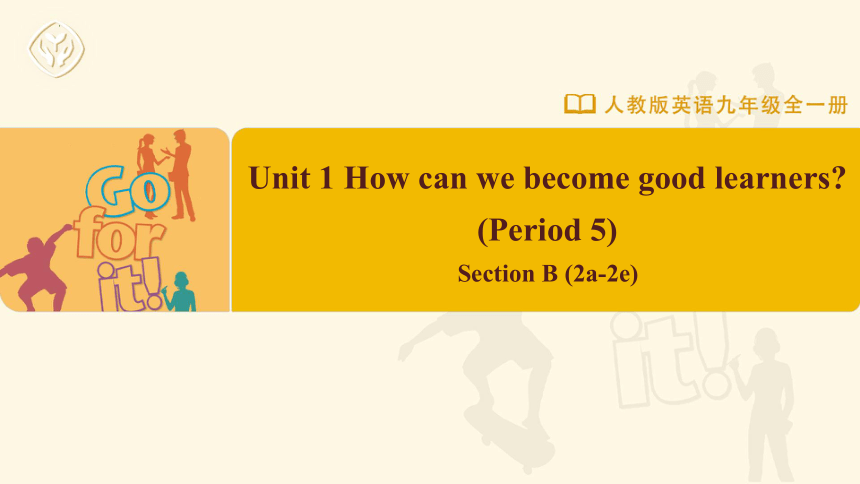 | |
| 格式 | pptx | ||
| 文件大小 | 2.9MB | ||
| 资源类型 | 教案 | ||
| 版本资源 | 人教新目标(Go for it)版 | ||
| 科目 | 英语 | ||
| 更新时间 | 2023-08-10 17:33:09 | ||
图片预览

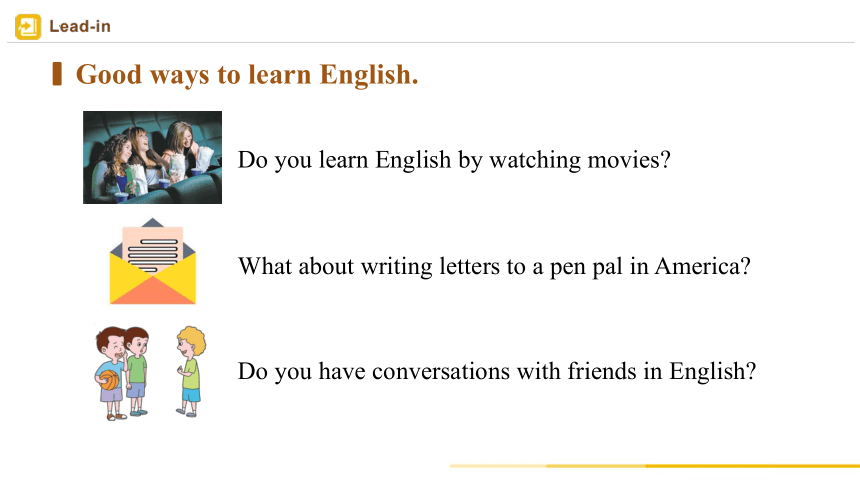
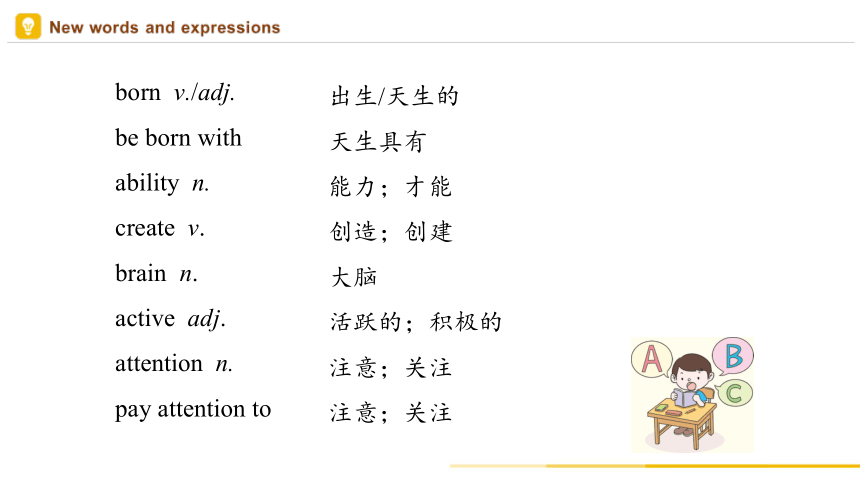

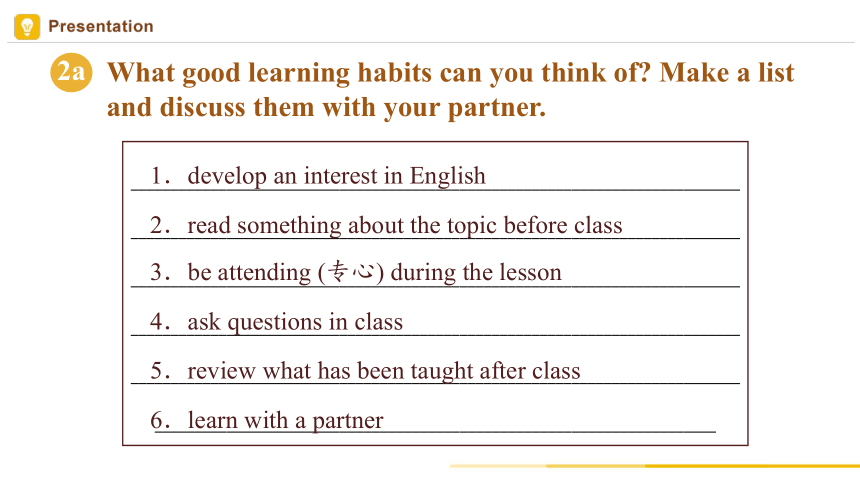
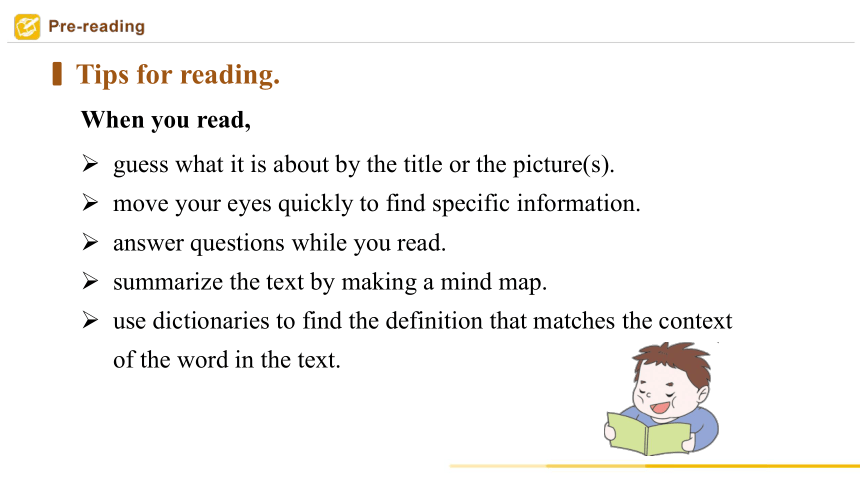
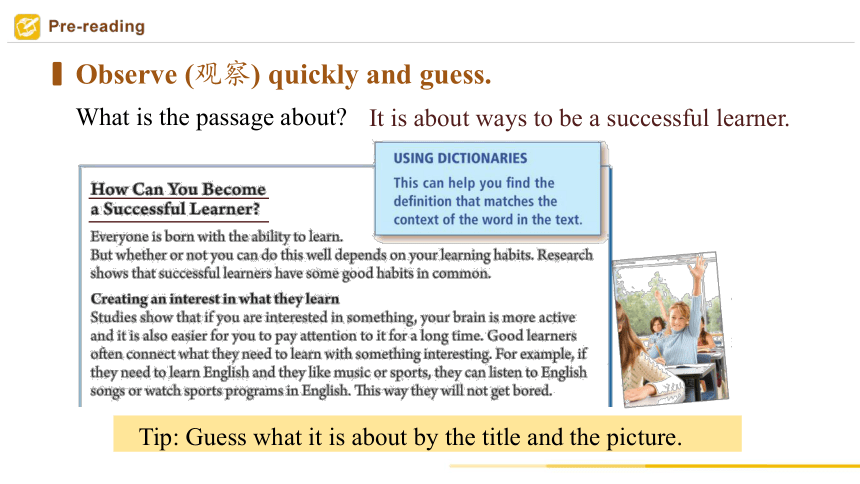
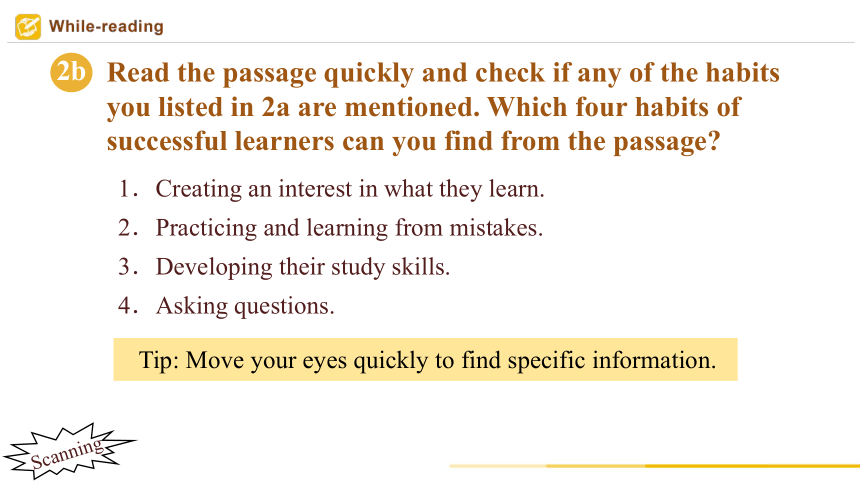
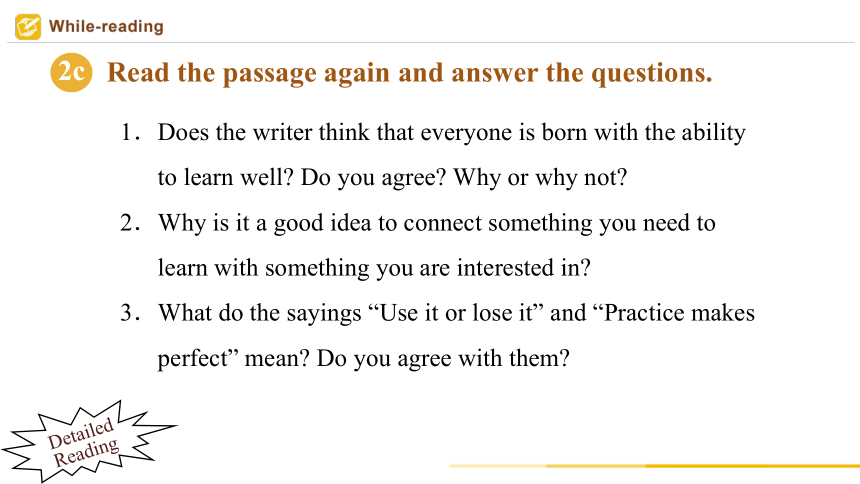
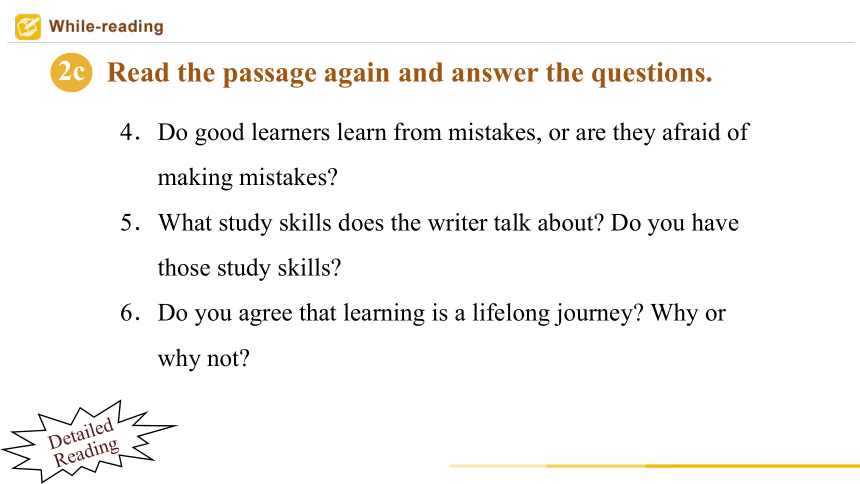
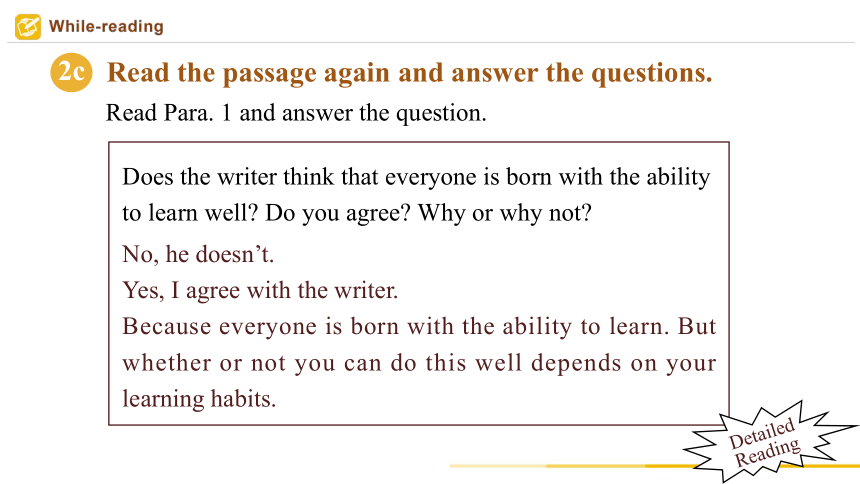
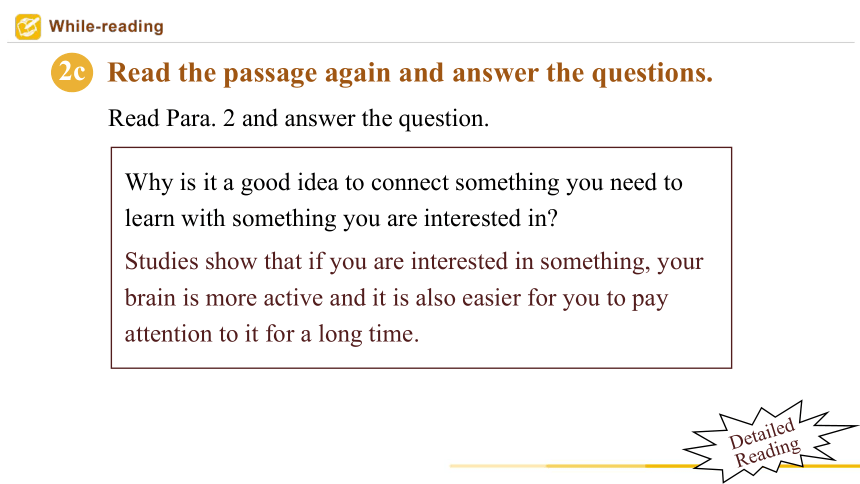
文档简介
(共40张PPT)
Unit 1 How can we become good learners
(Period 5)
Section B (2a-2e)
Good ways to learn English.
Do you learn English by watching movies
What about writing letters to a pen pal in America
Do you have conversations with friends in English
born v./adj.
be born with
ability n.
create v.
brain n.
active adj.
attention n.
pay attention to
出生/天生的
天生具有
能力;才能
创造;创建
大脑
活跃的;积极的
注意;关注
注意;关注
connect v.
connect ... with
overnight adv.
review v. & n.
knowledge n.
lifelong adj.
wisely adv.
(使)连接;与……有联系
把……和……连接或联系起来
一夜之间;在夜间
回顾;复习
知识;学问
终身的;毕生的
明智地;聪明地
__________________________________________________________________________________________________________________________________________________________________________________________________________________________________________________________________________________________________________________________________________________________________________________________________________________________________________________________________
1.develop an interest in English
2a
What good learning habits can you think of Make a list and discuss them with your partner.
2.read something about the topic before class
3.be attending (专心) during the lesson
4.ask questions in class
5.review what has been taught after class
6.learn with a partner
Tips for reading.
When you read,
guess what it is about by the title or the picture(s).
move your eyes quickly to find specific information.
answer questions while you read.
summarize the text by making a mind map.
use dictionaries to find the definition that matches the context of the word in the text.
Observe (观察) quickly and guess.
What is the passage about
It is about ways to be a successful learner.
Tip: Guess what it is about by the title and the picture.
2b
Read the passage quickly and check if any of the habits you listed in 2a are mentioned. Which four habits of successful learners can you find from the passage
1.Creating an interest in what they learn.
2.Practicing and learning from mistakes.
3.Developing their study skills.
4.Asking questions.
Tip: Move your eyes quickly to find specific information.
Scanning
2c
Read the passage again and answer the questions.
1.Does the writer think that everyone is born with the ability
to learn well Do you agree Why or why not
2.Why is it a good idea to connect something you need to
learn with something you are interested in
3.What do the sayings “Use it or lose it” and “Practice makes
perfect” mean Do you agree with them
Detailed
Reading
2c
Read the passage again and answer the questions.
4.Do good learners learn from mistakes, or are they afraid of
making mistakes
5.What study skills does the writer talk about Do you have
those study skills
6.Do you agree that learning is a lifelong journey Why or
why not
Detailed
Reading
2c
Read the passage again and answer the questions.
Read Para. 1 and answer the question.
Does the writer think that everyone is born with the ability to learn well Do you agree Why or why not
No, he doesn’t.
Yes, I agree with the writer.
Because everyone is born with the ability to learn. But whether or not you can do this well depends on your learning habits.
Detailed
Reading
2c
Read the passage again and answer the questions.
Read Para. 2 and answer the question.
Why is it a good idea to connect something you need to learn with something you are interested in
Studies show that if you are interested in something, your brain is more active and it is also easier for you to pay attention to it for a long time.
Detailed
Reading
2c
Read the passage again and answer the questions.
Read Para. 3 and answer the questions.
What do the sayings “Use it or lose it” and “Practice makes perfect” mean Do you agree with them
Use it or lose it: If you stop doing something, you will forget how to do it.
Practice makes perfect: If you do something again and again, you will become very good at it.
Yes, I do.
Detailed
Reading
2c
Read the passage again and answer the questions.
Read Para. 3 and answer the questions.
Do good learners learn from mistakes, or are they afraid of making mistakes
They learn from their mistakes, and they are not afraid of making mistakes.
Detailed
Reading
Read Paras. 4 and 5 and answer the question.
What study skills does the writer talk about Do you have those study skills
Take notes by writing down keys words or by drawing mind maps. / Look for ways to review what has been learnt. / Ask questions during or after class. They even ask each other.
Yes, I do. / No, I don’t.
Detailed
Reading
2c
Read the passage again and answer the questions.
Read Para. 6 and answer the question.
Do you agree that learning is a lifelong journey Why or why not
Yes. Learning is a lifelong journey.
Because every day brings something new.
Detailed
Reading
2c
Read the passage again and answer the questions.
How Can You Become a Successful Learner
Make a mind map according to 2b.
Tip: Summarize the passage by making a mind map.
Para. 1
Paras. 2-5
draw a conclusion (结论)
Para. 6
show us the opinion
show us the specific ways
Part 1
Part 2
Part 3
2d
Look up the following words from the passage in the dictionary. Then write a sentence for each word.
brain n. connect v. overnight adv.
attention n. review v. knowledge n.
ability n. active adj. wisely adv.
e.g. brain: A good way to train the brain is to do some math
exercises every day.
2d
Look up the following words from the passage in the dictionary. Then write a sentence for each word.
connect v. _________________________________________
overnight adv. _________________________________________
attention n. _________________________________________
review v. _________________________________________
knowledge n. _________________________________________
ability n. _________________________________________
active adj. _________________________________________
wisely adv. _________________________________________
I cannot connect the two things in my mind.
We stayed overnight with my mother.
He was waving his arms to draw their attention.
The next day we reviewed the previous day’s work.
They successfully communicate their knowledge to others.
I have confidence in the ability of the players.
His daughter was very active and noisy in the mornings.
He never behaves honestly, nor wisely.
2e
Do you think you are a good learner What learning habits do you think are useful Discuss with your group and share your ideas with the class.
(1)be born with 表示“天生具有”,其中 born 是动词,意为
“出生”,多用于被动语态。
1.Everyone is born with the ability to learn.
每个人天生具有学习的能力。
① be born in/on 表示“出生于……”。
拓展
e.g. He was born with a good memory. 他生来记忆力就很好。
e.g. Sally was born in a small village on April 4.
萨莉4月4日出生于一个小村庄。
② born 还可以作形容词,意为“天生的”,作定语修饰名词。
e.g. He is a born poet. 他天生是个诗人。
(2)ability 名词,意为“能力;才能”,后面常跟 to do 表示
“做某事的能力”。
1.Everyone is born with the ability to learn.
每个人天生具有学习的能力。
e.g. The boy shows great ability at math.
这个男孩显示出很棒的数学才能。
The students have mixed abilities.
学生们有各种才能。
He has the ability to do the job.
他有能力做这份工作。
depend on 表示“视……而定;取决于;依靠;依赖;相信”,后接名词、代词、动词 -ing 形式或宾语从句。既不能用于进行时态,也不能用于被动语态。
2.But whether or not you can do this well depends on your learning
habits. 但是你是否能学好取决于你的学习习惯。
e.g. Good health depends on good food, exercise and enough sleep.
健康依赖于好的食物、运动和充足的睡眠。
You can depend on him to make a sound choice.
你可以依靠他做出正确选择。
You may depend on his coming. 你可以相信他会来。
(1)forget 及物动词,意为“忘记”,其反义词是 remember。
forget 后可直接跟名词或代词作宾语,也可跟动词不定式和
动词 -ing形式。forget to do sth.“忘记去做某事”,表示事情
还没有做;forget doing sth.“忘记做过某事”,表示事情已经
做过,但是忘记做过了。
3.Even if you learn something well, you will forget it unless you use it.
即使是你学得好的东西,如果你不使用,也会忘记。
e.g. I forgot to close the door.
我忘记关门了。
I forgot closing the door. 我忘记已经关门了。
3.Even if you learn something well, you will forget it unless you use it.
即使是你学得好的东西,如果你不使用,也会忘记。
forget 与 leave
辨析
e.g. Don’t forget to take your ticket. 别忘了带票。
I’ve left my wallet at home. 我把钱包落在家里了。
forget 通常不能与表示地点的副词或短语连用
leave 表示“遗忘”时,通常要与表示地点的状语连用
(2)unless 连词,意为“除非;如果不”,引导条件状语从句,
相当于 if not,在许多情况下两者可以互换。
3.Even if you learn something well, you will forget it unless you use it.
即使是你学得好的东西,如果你不使用,也会忘记。
e.g. Don’t come unless I telephone you.
如果我不打电话,你就不要来。
You will get good grades in the exam unless you don’t revise
for it. 你们会在考试中取得好成绩的,除非你们不复习。
注意
如果 unless 从句本身是否定句,则 unless 不能用 if ... not 替换。
keep doing sth. 表示“一直/继续做某事”。
4.Good learners will keep practicing what they have learned ...
优秀的学习者会继续练习他们已经学过的知识……
e.g. He didn’t stop, and he just kept running.
他没有停下来,还在继续跑。
Life is like riding a bicycle. To keep your balance, you must
keep moving.
生活就像骑自行车,要想保持平衡,必须不断前行。
If you are going through joy, keep going.
如果你正在体验愉悦,那就继续吧。
4.Good learners will keep practicing what they have learned ...
优秀的学习者会继续练习他们已经学过的知识……
keep 构成的其他常用短语
拓展
① keep sb. doing sth. 让某人一直做某事
② keep sb. from doing sth. 阻止某人做某事(from 不可省略)
e.g. I’m sorry to have kept you waiting so long.
对不起,让你久等了。
He tried to keep Sue from falling.
他努力地抓紧休,防止她跌倒。
5.For example, they may take notes by writing down key words or
by drawing mind maps.
例如,他们可能通过写下关键词或者画思维图来做笔记。
(1)for example 意为“例如”,往往用逗号与其他成分隔开,位
置比较灵活,可以置于句首、句中或句末。
e.g. They have fish, vegetables and noodles, for example.
例如,他们有鱼、蔬菜和面条。
① for example 常用来举例说明一种情况,一般只举一例。 后面
的例子可以是单词、短语或句子。常用作插入语,一般用逗号
与其他成分隔开,可以位于句首、句中或句末。
for example 与 such as
辨析
e.g. There are some other problems. For example, we don’t have
enough time.
还有一些其他问题。比如说,我们没有足够的时间。
5.For example, they may take notes by writing down key words or
by drawing mind maps.
例如,他们可能通过写下关键词或者画思维图来做笔记。
e.g. People in many countries speak English, such as Canada and
America. 许多国家的人说英语,如加拿大和美国。
② such as 一般用来列举同类事物中的几个,常用在被列举的人
或事物与前面的名词之间,其后一般不用逗号,后面的例子只
能是单词或短语。
for example 与 such as
辨析
5.For example, they may take notes by writing down key words or
by drawing mind maps.
例如,他们可能通过写下关键词或者画思维图来做笔记。
e.g. We don’t mind how far we have to go. 我们不介意要走多远。
Do you mind giving me a glass of water 请给我杯水好吗
mind 也可用作动词,意为“介意”。常用于疑问句或否定句中,可与条件句连用。其后常接名词或动词 -ing 形式作宾语。
mind 的其他用法
拓展
(2)mind 此处用作名词,意为“思维;想法”。
e.g. An idea comes into my mind. 我计上心来。
He changed his mind yesterday. 昨天他改变了主意。
5.For example, they may take notes by writing down key words or
by drawing mind maps.
例如,他们可能通过写下关键词或者画思维图来做笔记。
6.They also look for ways to review what they have learned.
他们也设法复习已经学过的知识。
look for、find 与 find out
辨析
(1)look for 表示“寻找”,后跟名词或代词作宾语。
e.g. They are looking for the missing child.
他们正在寻找失踪的孩子。
look for “寻找”,强调寻找的动作和过程,是有目的地找
find “找到;发现”,通常指找到或发现具体的东西,也可指偶然发现某物或某种情况,强调结果
find out “弄清;查明”,多指通过调查、询问、研究等之后“搞清楚、弄明白”,常含有经过困难、曲折的意味
(2)review 此处用作动词,意为“回顾;复习”。
Sam never forgets to review his lessons. 萨姆从未忘记复习功课。
6.They also look for ways to review what they have learned.
他们也设法复习已经学过的知识。
e.g. I’m looking for my pen everywhere, but I can’t find it.
我正在到处找我的钢笔,但是找不到它。
Read the passage, and find out the answer to this question.
阅读短文,找出这个问题的答案。
e.g. We’d better make a plan for the review. 我们最好制订复习计划。
review 还可以作名词,意为“回顾;复习”。
拓展
(2)question 用作动词,意为“表示疑问;怀疑”,还可表示“正
式提问;质询”。
7.Knowledge comes from questioning. 知识来自质疑。
(1)knowledge 不可数名词,意为“知识;学问”。
e.g. He always asks some strange questions. 他总是问一些奇怪问题。
question 还可以做可数名词,意为“问题”。
拓展
e.g. Knowledge is power. 知识就是力量。
Mr. Green is a man of knowledge.
格林先生是一个有学问的人。
e.g. They are questioning the witness. 他们正在询问证人。
born
be born with
ability
create
brain
active
attention
pay attention to
出生/天生的
天生具有
能力;才能
创造;创建
大脑
活跃的;积极的
注意;关注
注意;关注(短语)
Words and expressions
connect
connect ... with
overnight
review
knowledge
lifelong
wisely
(使)连接;与……有联系
把……和……连接或联系起来
一夜之间;在夜间
回顾;复习
知识;学问
终身的;毕生的
明智地;聪明地
Words and expressions
Sentences
1.Everyone is born with the ability to learn.
2.But whether or not you can do this well depends on your learning
habits.
3.Even if you learn something well, you will forget it unless you use it.
4.Good learners will keep practicing what they have learned ...
5.For example, they may take notes by writing down key words or by
drawing mind maps.
6.They also look for ways to review what they have learned.
7.Knowledge comes from questioning.
Write a short passage (80-100 words) about how to become a good learner.
Part 1 show us the opinion
Part 2 show us the specific ways
Part 3 draw a conclusion
Unit 1 How can we become good learners
(Period 5)
Section B (2a-2e)
Good ways to learn English.
Do you learn English by watching movies
What about writing letters to a pen pal in America
Do you have conversations with friends in English
born v./adj.
be born with
ability n.
create v.
brain n.
active adj.
attention n.
pay attention to
出生/天生的
天生具有
能力;才能
创造;创建
大脑
活跃的;积极的
注意;关注
注意;关注
connect v.
connect ... with
overnight adv.
review v. & n.
knowledge n.
lifelong adj.
wisely adv.
(使)连接;与……有联系
把……和……连接或联系起来
一夜之间;在夜间
回顾;复习
知识;学问
终身的;毕生的
明智地;聪明地
__________________________________________________________________________________________________________________________________________________________________________________________________________________________________________________________________________________________________________________________________________________________________________________________________________________________________________________________________
1.develop an interest in English
2a
What good learning habits can you think of Make a list and discuss them with your partner.
2.read something about the topic before class
3.be attending (专心) during the lesson
4.ask questions in class
5.review what has been taught after class
6.learn with a partner
Tips for reading.
When you read,
guess what it is about by the title or the picture(s).
move your eyes quickly to find specific information.
answer questions while you read.
summarize the text by making a mind map.
use dictionaries to find the definition that matches the context of the word in the text.
Observe (观察) quickly and guess.
What is the passage about
It is about ways to be a successful learner.
Tip: Guess what it is about by the title and the picture.
2b
Read the passage quickly and check if any of the habits you listed in 2a are mentioned. Which four habits of successful learners can you find from the passage
1.Creating an interest in what they learn.
2.Practicing and learning from mistakes.
3.Developing their study skills.
4.Asking questions.
Tip: Move your eyes quickly to find specific information.
Scanning
2c
Read the passage again and answer the questions.
1.Does the writer think that everyone is born with the ability
to learn well Do you agree Why or why not
2.Why is it a good idea to connect something you need to
learn with something you are interested in
3.What do the sayings “Use it or lose it” and “Practice makes
perfect” mean Do you agree with them
Detailed
Reading
2c
Read the passage again and answer the questions.
4.Do good learners learn from mistakes, or are they afraid of
making mistakes
5.What study skills does the writer talk about Do you have
those study skills
6.Do you agree that learning is a lifelong journey Why or
why not
Detailed
Reading
2c
Read the passage again and answer the questions.
Read Para. 1 and answer the question.
Does the writer think that everyone is born with the ability to learn well Do you agree Why or why not
No, he doesn’t.
Yes, I agree with the writer.
Because everyone is born with the ability to learn. But whether or not you can do this well depends on your learning habits.
Detailed
Reading
2c
Read the passage again and answer the questions.
Read Para. 2 and answer the question.
Why is it a good idea to connect something you need to learn with something you are interested in
Studies show that if you are interested in something, your brain is more active and it is also easier for you to pay attention to it for a long time.
Detailed
Reading
2c
Read the passage again and answer the questions.
Read Para. 3 and answer the questions.
What do the sayings “Use it or lose it” and “Practice makes perfect” mean Do you agree with them
Use it or lose it: If you stop doing something, you will forget how to do it.
Practice makes perfect: If you do something again and again, you will become very good at it.
Yes, I do.
Detailed
Reading
2c
Read the passage again and answer the questions.
Read Para. 3 and answer the questions.
Do good learners learn from mistakes, or are they afraid of making mistakes
They learn from their mistakes, and they are not afraid of making mistakes.
Detailed
Reading
Read Paras. 4 and 5 and answer the question.
What study skills does the writer talk about Do you have those study skills
Take notes by writing down keys words or by drawing mind maps. / Look for ways to review what has been learnt. / Ask questions during or after class. They even ask each other.
Yes, I do. / No, I don’t.
Detailed
Reading
2c
Read the passage again and answer the questions.
Read Para. 6 and answer the question.
Do you agree that learning is a lifelong journey Why or why not
Yes. Learning is a lifelong journey.
Because every day brings something new.
Detailed
Reading
2c
Read the passage again and answer the questions.
How Can You Become a Successful Learner
Make a mind map according to 2b.
Tip: Summarize the passage by making a mind map.
Para. 1
Paras. 2-5
draw a conclusion (结论)
Para. 6
show us the opinion
show us the specific ways
Part 1
Part 2
Part 3
2d
Look up the following words from the passage in the dictionary. Then write a sentence for each word.
brain n. connect v. overnight adv.
attention n. review v. knowledge n.
ability n. active adj. wisely adv.
e.g. brain: A good way to train the brain is to do some math
exercises every day.
2d
Look up the following words from the passage in the dictionary. Then write a sentence for each word.
connect v. _________________________________________
overnight adv. _________________________________________
attention n. _________________________________________
review v. _________________________________________
knowledge n. _________________________________________
ability n. _________________________________________
active adj. _________________________________________
wisely adv. _________________________________________
I cannot connect the two things in my mind.
We stayed overnight with my mother.
He was waving his arms to draw their attention.
The next day we reviewed the previous day’s work.
They successfully communicate their knowledge to others.
I have confidence in the ability of the players.
His daughter was very active and noisy in the mornings.
He never behaves honestly, nor wisely.
2e
Do you think you are a good learner What learning habits do you think are useful Discuss with your group and share your ideas with the class.
(1)be born with 表示“天生具有”,其中 born 是动词,意为
“出生”,多用于被动语态。
1.Everyone is born with the ability to learn.
每个人天生具有学习的能力。
① be born in/on 表示“出生于……”。
拓展
e.g. He was born with a good memory. 他生来记忆力就很好。
e.g. Sally was born in a small village on April 4.
萨莉4月4日出生于一个小村庄。
② born 还可以作形容词,意为“天生的”,作定语修饰名词。
e.g. He is a born poet. 他天生是个诗人。
(2)ability 名词,意为“能力;才能”,后面常跟 to do 表示
“做某事的能力”。
1.Everyone is born with the ability to learn.
每个人天生具有学习的能力。
e.g. The boy shows great ability at math.
这个男孩显示出很棒的数学才能。
The students have mixed abilities.
学生们有各种才能。
He has the ability to do the job.
他有能力做这份工作。
depend on 表示“视……而定;取决于;依靠;依赖;相信”,后接名词、代词、动词 -ing 形式或宾语从句。既不能用于进行时态,也不能用于被动语态。
2.But whether or not you can do this well depends on your learning
habits. 但是你是否能学好取决于你的学习习惯。
e.g. Good health depends on good food, exercise and enough sleep.
健康依赖于好的食物、运动和充足的睡眠。
You can depend on him to make a sound choice.
你可以依靠他做出正确选择。
You may depend on his coming. 你可以相信他会来。
(1)forget 及物动词,意为“忘记”,其反义词是 remember。
forget 后可直接跟名词或代词作宾语,也可跟动词不定式和
动词 -ing形式。forget to do sth.“忘记去做某事”,表示事情
还没有做;forget doing sth.“忘记做过某事”,表示事情已经
做过,但是忘记做过了。
3.Even if you learn something well, you will forget it unless you use it.
即使是你学得好的东西,如果你不使用,也会忘记。
e.g. I forgot to close the door.
我忘记关门了。
I forgot closing the door. 我忘记已经关门了。
3.Even if you learn something well, you will forget it unless you use it.
即使是你学得好的东西,如果你不使用,也会忘记。
forget 与 leave
辨析
e.g. Don’t forget to take your ticket. 别忘了带票。
I’ve left my wallet at home. 我把钱包落在家里了。
forget 通常不能与表示地点的副词或短语连用
leave 表示“遗忘”时,通常要与表示地点的状语连用
(2)unless 连词,意为“除非;如果不”,引导条件状语从句,
相当于 if not,在许多情况下两者可以互换。
3.Even if you learn something well, you will forget it unless you use it.
即使是你学得好的东西,如果你不使用,也会忘记。
e.g. Don’t come unless I telephone you.
如果我不打电话,你就不要来。
You will get good grades in the exam unless you don’t revise
for it. 你们会在考试中取得好成绩的,除非你们不复习。
注意
如果 unless 从句本身是否定句,则 unless 不能用 if ... not 替换。
keep doing sth. 表示“一直/继续做某事”。
4.Good learners will keep practicing what they have learned ...
优秀的学习者会继续练习他们已经学过的知识……
e.g. He didn’t stop, and he just kept running.
他没有停下来,还在继续跑。
Life is like riding a bicycle. To keep your balance, you must
keep moving.
生活就像骑自行车,要想保持平衡,必须不断前行。
If you are going through joy, keep going.
如果你正在体验愉悦,那就继续吧。
4.Good learners will keep practicing what they have learned ...
优秀的学习者会继续练习他们已经学过的知识……
keep 构成的其他常用短语
拓展
① keep sb. doing sth. 让某人一直做某事
② keep sb. from doing sth. 阻止某人做某事(from 不可省略)
e.g. I’m sorry to have kept you waiting so long.
对不起,让你久等了。
He tried to keep Sue from falling.
他努力地抓紧休,防止她跌倒。
5.For example, they may take notes by writing down key words or
by drawing mind maps.
例如,他们可能通过写下关键词或者画思维图来做笔记。
(1)for example 意为“例如”,往往用逗号与其他成分隔开,位
置比较灵活,可以置于句首、句中或句末。
e.g. They have fish, vegetables and noodles, for example.
例如,他们有鱼、蔬菜和面条。
① for example 常用来举例说明一种情况,一般只举一例。 后面
的例子可以是单词、短语或句子。常用作插入语,一般用逗号
与其他成分隔开,可以位于句首、句中或句末。
for example 与 such as
辨析
e.g. There are some other problems. For example, we don’t have
enough time.
还有一些其他问题。比如说,我们没有足够的时间。
5.For example, they may take notes by writing down key words or
by drawing mind maps.
例如,他们可能通过写下关键词或者画思维图来做笔记。
e.g. People in many countries speak English, such as Canada and
America. 许多国家的人说英语,如加拿大和美国。
② such as 一般用来列举同类事物中的几个,常用在被列举的人
或事物与前面的名词之间,其后一般不用逗号,后面的例子只
能是单词或短语。
for example 与 such as
辨析
5.For example, they may take notes by writing down key words or
by drawing mind maps.
例如,他们可能通过写下关键词或者画思维图来做笔记。
e.g. We don’t mind how far we have to go. 我们不介意要走多远。
Do you mind giving me a glass of water 请给我杯水好吗
mind 也可用作动词,意为“介意”。常用于疑问句或否定句中,可与条件句连用。其后常接名词或动词 -ing 形式作宾语。
mind 的其他用法
拓展
(2)mind 此处用作名词,意为“思维;想法”。
e.g. An idea comes into my mind. 我计上心来。
He changed his mind yesterday. 昨天他改变了主意。
5.For example, they may take notes by writing down key words or
by drawing mind maps.
例如,他们可能通过写下关键词或者画思维图来做笔记。
6.They also look for ways to review what they have learned.
他们也设法复习已经学过的知识。
look for、find 与 find out
辨析
(1)look for 表示“寻找”,后跟名词或代词作宾语。
e.g. They are looking for the missing child.
他们正在寻找失踪的孩子。
look for “寻找”,强调寻找的动作和过程,是有目的地找
find “找到;发现”,通常指找到或发现具体的东西,也可指偶然发现某物或某种情况,强调结果
find out “弄清;查明”,多指通过调查、询问、研究等之后“搞清楚、弄明白”,常含有经过困难、曲折的意味
(2)review 此处用作动词,意为“回顾;复习”。
Sam never forgets to review his lessons. 萨姆从未忘记复习功课。
6.They also look for ways to review what they have learned.
他们也设法复习已经学过的知识。
e.g. I’m looking for my pen everywhere, but I can’t find it.
我正在到处找我的钢笔,但是找不到它。
Read the passage, and find out the answer to this question.
阅读短文,找出这个问题的答案。
e.g. We’d better make a plan for the review. 我们最好制订复习计划。
review 还可以作名词,意为“回顾;复习”。
拓展
(2)question 用作动词,意为“表示疑问;怀疑”,还可表示“正
式提问;质询”。
7.Knowledge comes from questioning. 知识来自质疑。
(1)knowledge 不可数名词,意为“知识;学问”。
e.g. He always asks some strange questions. 他总是问一些奇怪问题。
question 还可以做可数名词,意为“问题”。
拓展
e.g. Knowledge is power. 知识就是力量。
Mr. Green is a man of knowledge.
格林先生是一个有学问的人。
e.g. They are questioning the witness. 他们正在询问证人。
born
be born with
ability
create
brain
active
attention
pay attention to
出生/天生的
天生具有
能力;才能
创造;创建
大脑
活跃的;积极的
注意;关注
注意;关注(短语)
Words and expressions
connect
connect ... with
overnight
review
knowledge
lifelong
wisely
(使)连接;与……有联系
把……和……连接或联系起来
一夜之间;在夜间
回顾;复习
知识;学问
终身的;毕生的
明智地;聪明地
Words and expressions
Sentences
1.Everyone is born with the ability to learn.
2.But whether or not you can do this well depends on your learning
habits.
3.Even if you learn something well, you will forget it unless you use it.
4.Good learners will keep practicing what they have learned ...
5.For example, they may take notes by writing down key words or by
drawing mind maps.
6.They also look for ways to review what they have learned.
7.Knowledge comes from questioning.
Write a short passage (80-100 words) about how to become a good learner.
Part 1 show us the opinion
Part 2 show us the specific ways
Part 3 draw a conclusion
同课章节目录
- Unit 1 How can we become good learners.
- Section A
- Section B
- Unit 2 I think that mooncakes are delicious!
- Section A
- Section B
- Unit 3 Could you please tell me where the restroom
- Section A
- Section B
- Unit 4 I used to be afraid of the dark.
- Section A
- Section B
- Unit 5 What are the shirts made of?
- Section A
- Section B
- Review of Units 1-5
- Unit 6 When was it invented?
- Section A
- Section B
- Unit 7 Teenagers should be allowed to choose their
- Section A
- Section B
- Unit 8 It must belong to Carla.
- Section A
- Section B
- Unit 9 I like music that I can dance to.
- Section A
- Section B
- Unit 10 You're supposed to shake hands.
- Section A
- Section B
- Review of Units 6-10
- Unit 11 Sad movies make me cry.
- Section A
- Section B
- Unit 12 Life is full of the unexpected
- Section A
- Section B
- Unit 13 We're trying to save the earth!
- Section A
- Section B
- Unit 14 I remember meeting all of you in Grade 7.
- Section A
- Section B
- Review of Units 11-14
